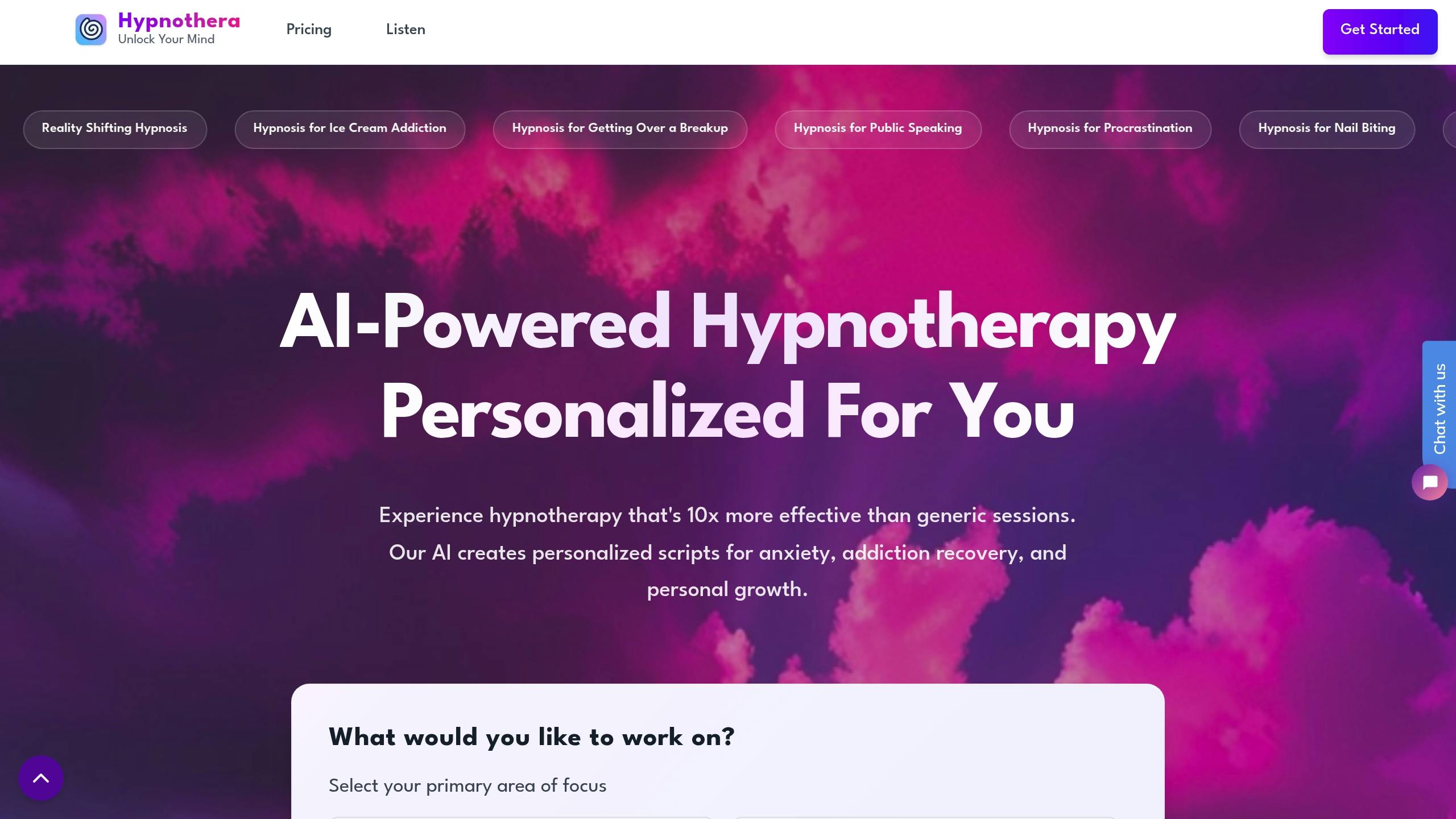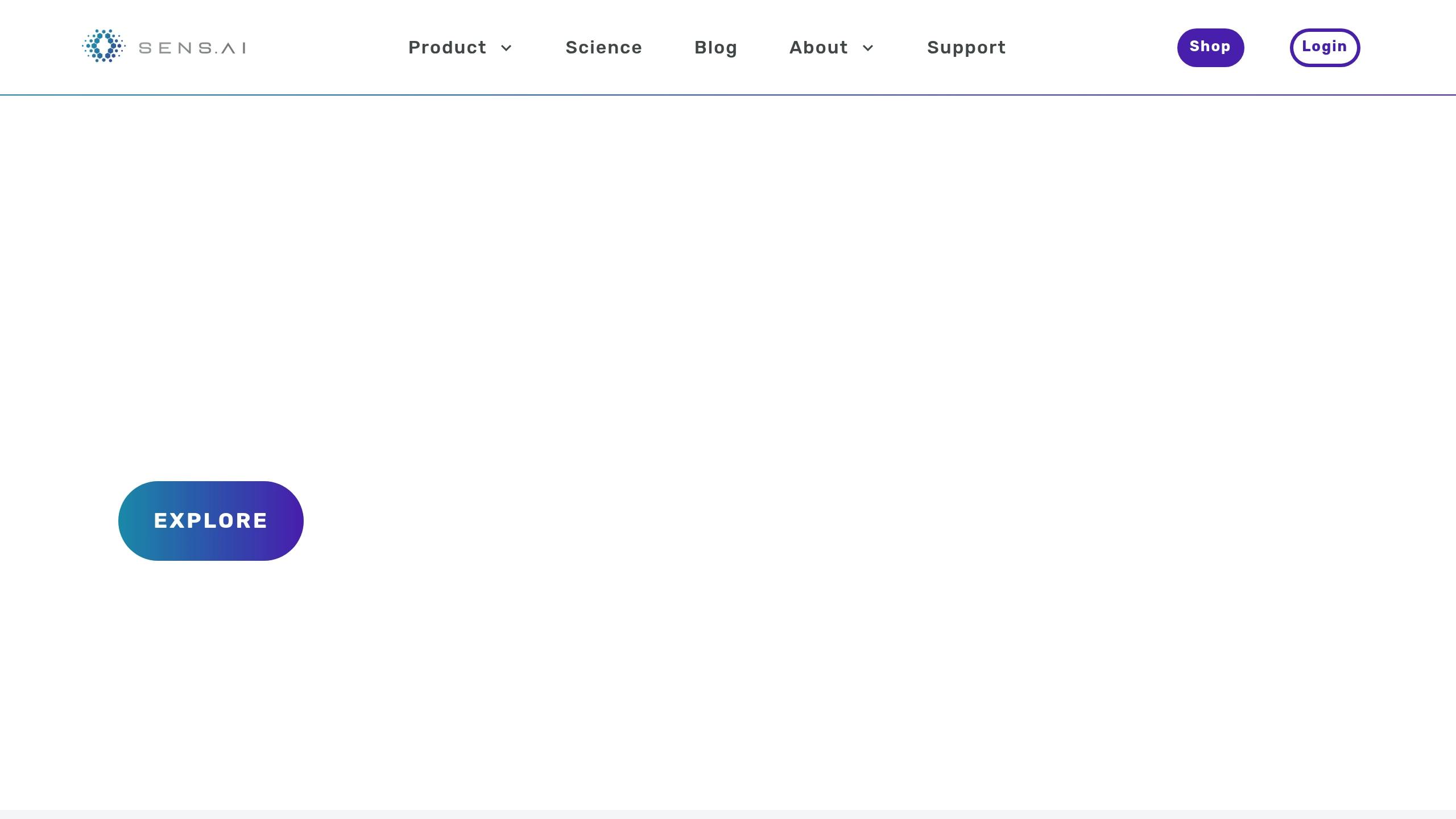Wearables and AI: Transforming Self-Hypnosis

Wearables and AI: Transforming Self-Hypnosis
AI and wearables are changing self-hypnosis. Tools like EEG headsets and biometric wearables now combine with AI to provide personalized, data-driven hypnosis experiences. Here’s what you need to know:
- Hypnothera: Uses AI to create custom hypnosis scripts based on user input and feedback. Subscription-based with multi-language support.
- Sens.ai: An advanced EEG system ($1,195) that tracks brainwaves like gamma waves for real-time feedback, improving focus, memory, and stress management.
- NeuroZen: A $299 wearable that monitors physiological responses like skin conductance, adjusting sessions for deeper relaxation.
Quick Comparison:
| Feature | Hypnothera | Sens.ai | NeuroZen |
|---|---|---|---|
| Core Tech | AI-powered scripts | EEG + AI feedback | Biometric tracking |
| Price | $14.99/month | $1,195 (device) | $299 + $14.99/month |
| Focus | Script customization | Brainwave training | Physiological data |
These platforms make self-hypnosis more accessible, personalized, and data-driven, catering to different goals like mental clarity, stress relief, or physical relaxation.
Related video from YouTube
1. Hypnothera Platform

Hypnothera uses real-time biometric tracking and user-reported feedback to create tailored mental health interventions. Unlike some platforms that directly integrate wearable sensors, Hypnothera relies on user input to adjust its AI-generated scripts. These scripts are fine-tuned to address specific mental health goals, improving over time through feedback and engagement analysis[2].
The platform offers subscription plans - Basic ($X/month) and Premium ($Y/month) - which provide different levels of access, including unlimited script generation and support for multiple languages[1].
Key features include:
- Multi-language support
- Custom audio environments
- Wearable integration
- Encrypted session history
Users can also personalize their audio experiences with various voice and style options, ensuring sessions remain engaging and effective[1].
This advanced AI customization lays the groundwork for exploring Sens.ai's neural interface approach in the following section.
2. Sens.ai EEG System

The Sens.ai EEG system brings professional-level neurofeedback training to your home, using AI to personalize the experience. Priced at $1,195, it combines high-quality EEG sensors with AI to improve self-hypnosis through real-time feedback [4].
What sets this system apart is its ability to detect brainwave patterns, including gamma waves - something rarely found in consumer devices. Gamma waves are linked to deeper focus and heightened awareness, and Sens.ai tracks these alongside heart rate variability (HRV) to provide insights into both mental and physical states during sessions [4].
The system provides feedback through various methods:
| Feedback Type | Function |
|---|---|
| Audio Cues | Reacts to brainwave changes in real time |
| Light Therapy | Adjusts lighting based on mental state |
| Visual Display | Displays live brainwave activity |
| Guided Instructions | Evolves based on the user's progress |
Sens.ai also offers tailored brain training programs aimed at specific goals:
- Improving memory
- Reducing brain fog
- Enhancing focus
- Managing stress
- Optimizing sleep quality
Its custom algorithms analyze brainwave data in real time, providing feedback through a mobile app. This allows users to track progress and make adjustments based on measurable data rather than relying solely on how they feel [4].
Although it's more expensive than basic devices, Sens.ai’s advanced feedback system takes self-hypnosis to a whole new level. Its clinical-level features set the stage for NeuroZen’s physiological approach, which we'll discuss next [4].
sbb-itb-f2aaef3
3. NeuroZen Device
The NeuroZen device takes self-hypnosis to a new level by blending biometric tracking with AI-driven personalization. Unlike Hypnothera, which focuses on custom scripts, or Sens.ai, which emphasizes neural training, NeuroZen zeroes in on how your body responds during sessions. This approach highlights the diverse ways AI is shaping self-hypnosis. At $299, plus a $14.99 monthly fee for premium content, it offers an affordable way to explore tech-enhanced hypnosis. It even snagged the "Best in Innovation" award at CES 2024 [1].
Using advanced sensors, NeuroZen tracks key physiological data:
| Feature | Function |
|---|---|
| Skin Conductance | Monitors emotional arousal and trance depth |
The device’s AI processes this data in real time, adjusting session elements like pacing and guidance intensity based on stress levels or other indicators [1][2].
Through its mobile app, NeuroZen enhances the experience with features like:
- Custom scripts, session analytics, and progress tracking.
The app’s adaptive algorithms fine-tune session timing and content based on how users respond over time, creating a tailored experience [2][3].
NeuroZen’s focus on physiological feedback adds a unique angle, complementing Hypnothera’s script customization and Sens.ai’s neural training. Together, they showcase three distinct approaches to modern self-hypnosis technology.
Platform Comparison
AI-enhanced self-hypnosis currently revolves around three main types of technology, each offering unique features:
| Feature | Hypnothera | Sens.ai | NeuroZen |
|---|---|---|---|
| Core Technology | AI-powered software | EEG hardware + software | Biometric wearable |
| Starting Price | $14.99/month | $1,499 (device) | N/A |
| Key Focus | Script customization | Neural training | Physiological feedback |
| Data Tracking | Session progress | Brainwave patterns | Physiological data |
| Access Method | Web/mobile platform | Dedicated headset | Wearable device |
This market is growing fast, with a projected 21.8% annual growth rate between 2022 and 2031 [1]. The increasing popularity of tech-based hypnosis tools highlights their shift into mainstream wellness.
User Experience and Market Position
Each platform offers a distinct user experience:
- Hypnothera boasts a strong reputation, earning a 4.7/5 rating from over 1,000 App Store reviews.
- Sens.ai, while newer, focuses on neural training but has limited user feedback due to its recent entry into the market [6][7].
- NeuroZen gained attention by winning the "Best in Innovation" award at CES 2024, signaling its potential to lead in the field [1].
Choosing the Right Platform
Selecting a platform often depends on individual needs:
- Budget and hardware preferences: Sens.ai requires a significant upfront investment, while Hypnothera is subscription-based.
- Customization options: Hypnothera excels in script personalization, whereas NeuroZen emphasizes physiological feedback.
- Feedback preferences: Some users may prioritize brainwave tracking, while others value biometric data.
These platforms highlight how AI can enhance self-hypnosis by addressing different needs - whether focusing on cognitive habits or physical responses - while still offering accessible and personalized solutions.
Conclusion
The combination of AI and wearable technology has reshaped self-hypnosis, making it easier to access, highly tailored, and more reliant on data than ever before.
Each platform brings its own strengths to the table. For those seeking affordable customization, Hypnothera is a solid choice. If neural-focused precision is your priority, Sens.ai stands out. Meanwhile, NeuroZen excels in integrating physiological feedback for a comprehensive experience. Your choice should align with your personal needs and goals.
Looking ahead, we can expect these advancements to merge with virtual reality and deeper use of health data for personalization. However, future progress must carefully balance tech advancements with maintaining therapeutic quality and addressing the privacy concerns highlighted earlier [3][5].
Explore more on our AI meditation platform and visualization app.